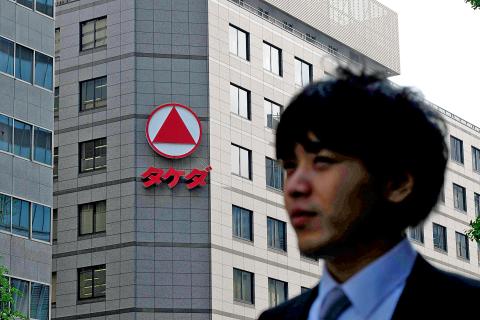Drug giant Takeda Pharmaceutical Co yesterday said it would buy Irish pharmaceuticals firm Shire PLC in a deal worth US$62.23 billion, in the biggest foreign takeover by a Japanese firm.
The deal, which would create one of the world’s top 10 drugs companies, caps a lengthy courtship by Takeda of its larger rival as it seeks to expand overseas.
Shire last month said its board would recommend the £46 billion (US$62.23 billion) bid “subject to satisfactory resolution of the other terms of the possible offer”.

Photo: AFP
Takeda yesterday announced that the boards of the two companies “have reached agreement on the terms of a recommended offer pursuant to which” the Japanese firm would buy Shire.
The announcement follows a string of lower offers rejected by Shire over the past month.
Analysts have said the buyout would be a smart move by Takeda as it looks to diversify, and could pay off in the long-term, but it has also raised concerns that the Japanese firm could be overextending itself financially.
In a separate statement, Takeda said it would fund the deal with a bridge loan facility of nearly US$31 billion.
The buyout is the latest in a flurry of merger and acquisition activity in the pharmaceutical industry as traditional players see profits eroded by competition from generic medicines.
Japanese firms in particular are facing pressure domestically as the government tries to cut prices of many branded drugs and increase the focus on cheaper generics to curb health spending as the population ages rapidly.
Takeda, led by Frenchman Christophe Weber, has been actively looking overseas for acquisitions.
In 2011, it took over Swiss rival Nycomed A/S for 9.6 billion euros (US$11.4 billion at the current exchange rate).
Analysts have described Shire as an attractive target for Takeda, with a portfolio of existing treatments in fields where the barriers to entry are high and profits large.
In particular, Shire would give Takeda access to research and development in fields the Japanese firm has long sought, including digestive systems, mental illness and rare diseases.
Takeda said that the buyout would create a global “biopharmaceutical leader” headquartered in Japan “with an attractive geographic footprint and the scale to drive future development.”
The acquisition would “strengthen Takeda’s core therapeutic areas, bringing together complementary positions in gastroenterology and neuroscience, and provide leading positions in rare diseases and plasma-derived therapies,” it added.
Shares in Tekeda closed up 3.99 percent at ¥4,638 just before the announcement, which had been widely expected.
The acquisition is expected to become effective in the first half of next year, it said.

Taiwanese suppliers to Taiwan Semiconductor Manufacturing Co. (TSMC, 台積電) are expected to follow the contract chipmaker’s step to invest in the US, but their relocation may be seven to eight years away, Minister of Economic Affairs J.W. Kuo (郭智輝) said yesterday. When asked by opposition Chinese Nationalist Party (KMT) Legislator Niu Hsu-ting (牛煦庭) in the legislature about growing concerns that TSMC’s huge investments in the US will prompt its suppliers to follow suit, Kuo said based on the chipmaker’s current limited production volume, it is unlikely to lead its supply chain to go there for now. “Unless TSMC completes its planned six

Intel Corp has named Tasha Chuang (莊蓓瑜) to lead Intel Taiwan in a bid to reinforce relations between the company and its Taiwanese partners. The appointment of Chuang as general manager for Intel Taiwan takes effect on Thursday, the firm said in a statement yesterday. Chuang is to lead her team in Taiwan to pursue product development and sales growth in an effort to reinforce the company’s ties with its partners and clients, Intel said. Chuang was previously in charge of managing Intel’s ties with leading Taiwanese PC brand Asustek Computer Inc (華碩), which included helping Asustek strengthen its global businesses, the company

Power supply and electronic components maker Delta Electronics Inc (台達電) yesterday said second-quarter revenue is expected to surpass the first quarter, which rose 30 percent year-on-year to NT$118.92 billion (US$3.71 billion). Revenue this quarter is likely to grow, as US clients have front-loaded orders ahead of US President Donald Trump’s planned tariffs on Taiwanese goods, Delta chairman Ping Cheng (鄭平) said at an earnings conference in Taipei, referring to the 90-day pause in tariff implementation Trump announced on April 9. While situations in the third and fourth quarters remain unclear, “We will not halt our long-term deployments and do not plan to

The New Taiwan dollar and Taiwanese stocks surged on signs that trade tensions between the world’s top two economies might start easing and as US tech earnings boosted the outlook of the nation’s semiconductor exports. The NT dollar strengthened as much as 3.8 percent versus the US dollar to 30.815, the biggest intraday gain since January 2011, closing at NT$31.064. The benchmark TAIEX jumped 2.73 percent to outperform the region’s equity gauges. Outlook for global trade improved after China said it is assessing possible trade talks with the US, providing a boost for the nation’s currency and shares. As the NT dollar